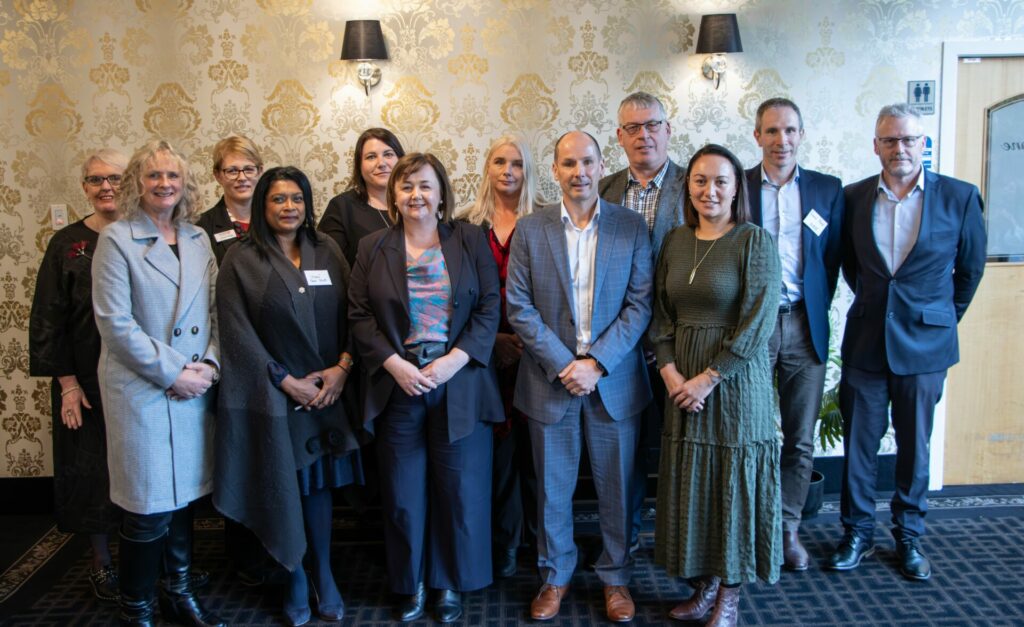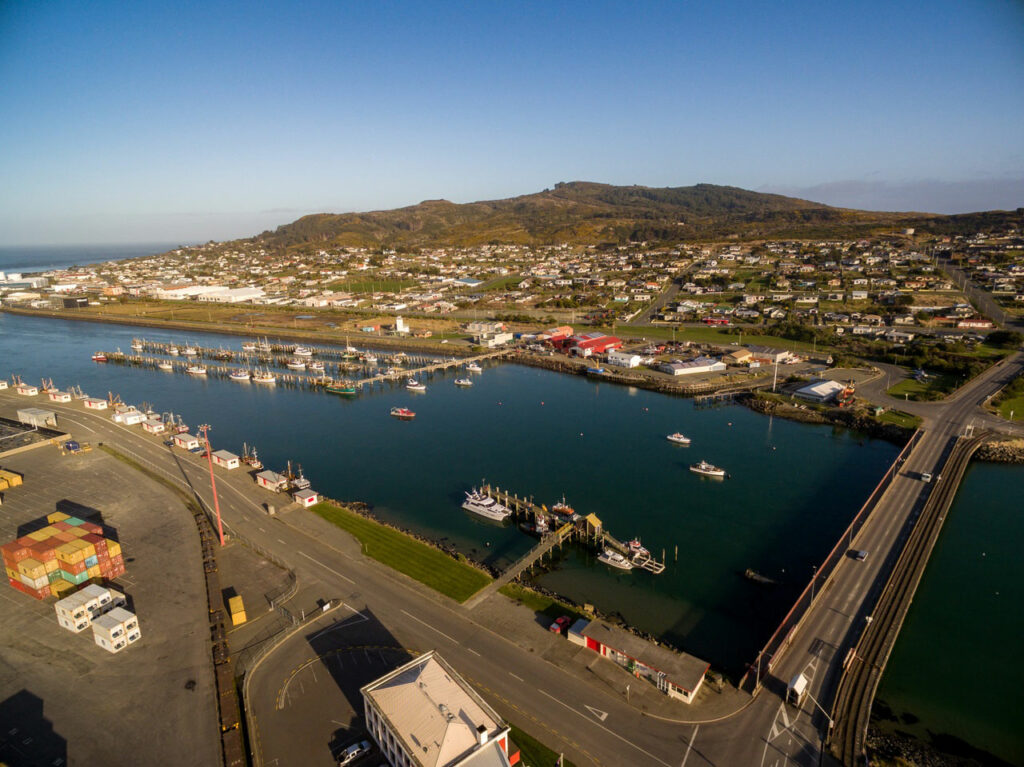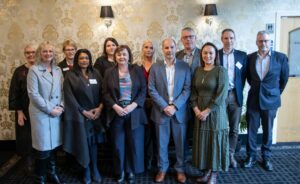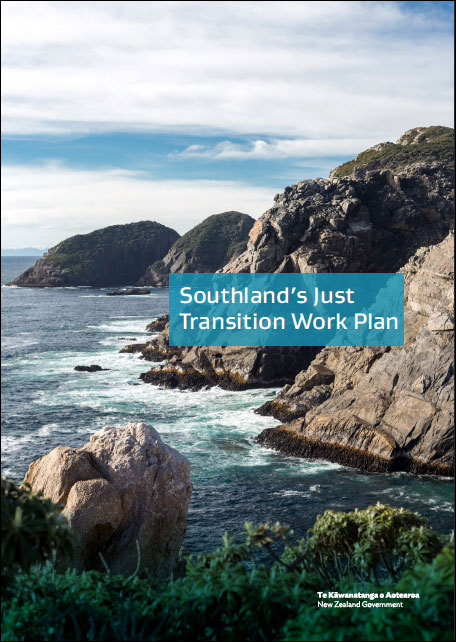Welcome
Government investing in
Southland’s just transition
Energy and Resources Minister Dr Megan Woods announced a $108m investment in Southland’s just transition. The funding delivers on the just transition’s goals of creating new industries, transitioning workers and skills, and supporting long-term planning.
“Today’s announcement shows the Government’s commitment to supporting Southland’s just transition. Helping local firms and workers capture new opportunities will reduce the region’s reliance on Rio Tinto and build regional resilience.”
The announcement comes off the back of two years of planning, delivered in partnership with regional leaders from iwi, local government, business, unions, and the education, community, and primary sectors. Speaking at the Murihiku Regeneration Collective’s energy and innovation wānanga on 23 May, Minister Woods congratulated the region on their work.
“The region has done a huge amount of work over the last two years to plan for Rio Tinto’s NZAS closure. I am thankful for the contributions of everyone who has participated in the just transition process so far.”

The package includes:
- $100m to deliver the Regional Hydrogen Transition, supporting early adopters consuming green hydrogen to deliver a just transition to a high wage, low emission economy.
- $8m to support other high-impact projects identified through the just transition process, including funding for:
- The Southland Engineering and Manufacturing Cluster, which will support suppliers to transition from reliance on NZAS business, participate fully in new economic opportunities and continue to support existing major industries. The cluster will target 100 businesses including the 50 NZAS supplier businesses.
- Further support Southland’s aquaculture industry to grow this sustainable, low-emissions industry that will provide economic diversity for the region.
- Ongoing support for the COIN – Southland Start-up and Innovation Eco-system will enable the establishment of new businesses and help existing businesses to transition and take advantage of opportunities in emerging industries.
Q&A
Why have these projects been selected?
- Community engagement led to the development of the Southland Just Transition Work Plan. This Work Plan outlined the community’s seven priority areas. Regional leaders selected key projects from these seven areas that would be the most impactful for the region.
- These initiatives were selected by regional leaders to be strategically focused on the regions’ specific strengths, needs and opportunities.
- They will create stability for Southland through diversifying their economy, focusing on high wage and low emissions jobs, building community resilience and supporting stronger regional leadership.
What regional outcomes will these projects provide?
- These initiatives will create stability for Southland through diversifying their economy, focusing on high wage and low emissions jobs, building community resilience and supporting stronger regional leadership.
- Specific outcomes include:
- Increasing competition in the electricity market.
- Building Southland’s economic diversity and resilience by developing new industries and business that do not rely on the aluminium smelter.
- Pathways for workers into decent work and new industries.
- Growing Southland’s aquaculture industry
- Building the region’s long-term strategic focus and leadership.
- Strengthening regional resilience and connectedness.
What Southland Just Transition projects have been funded?
- Regional Hydrogen Transition project
- Southland Manufacturing and Engineering Cluster programme
- Start-up and Innovation Hub
- Aquaculture development in Southland
- Job Match programme
- The development of the Food and Fibre Accelerator programme
- Long-Term Plan: Beyond 2025 Southland Regional Development Strategy
- Connected Murihiku project
- Enduring Oversight Group – regional leadership group
Why is there support for Southland if the smelter has not confirmed it is closing?
- Rio Tinto’s closure announcements, and subsequent reversals, have created continued uncertainty for Southland. Their decision to stay and or go is a commercial decision. This government believes it is important to create more regional stability and economic diversity regardless of the smelter’s decisions.
- The region has an overreliance on the aluminium smelter for jobs and work. Similarly, many employers rely on contracts from NZAS for a large share of their revenue.
Next Steps
- Regional leaders and project leaders will begin to implement these projects alongside businesses, communities and industries across Southland.
- These projects will be part of the region’s new Long-Term Plan, Beyond 2025, to ensure they have a strategic and long-term impact for Southland. Which can be found at https://beyond2025southland.nz/
Welcome to the website dedicated to keeping the community updated on the progress of Southland’s just transition. This site contains information on work that is under way, who is leading the work and why.
The contact page outlines how you can get involved.
But first, what have we set out the do? Collectively, regional leaders, working though the project’s Enduring Oversight Group, decided the just transition should help Southland:
“Build its economic, environmental and social resilience through and beyond the planned closure of the New Zealand Aluminium Smelter in December 2024.”
Following the July 2020 closure announcement of the New Zealand Aluminium Smelter (NZAS), the Government committed to support the Southland region through a just transition process. In response, the Ministry of Business, Innovation and Employment (MBIE) has supported a year-long engagement and planning process with Southlanders.
Regardless of the fate of NZAS, a key focus of the just transition is planning for and managing the social, economic, and environmental impacts of economic change. A transition process should support communities to include a range of perspectives in planning, seize opportunities, and mitigate harms.
Defining a just transition
Major economic changes, such as a large employer leaving a region, tend to disadvantage some groups more than others. At times, these changes will have enough of an impact to cause long term harm to the community unless properly managed.
A concerted, cross-sector effort can mitigate these harms, support a community to adapt and manage impacts, and take advantage of new opportunities – we call this a just transition.
In general terms, a just transition is a strategy to help a region lead its own planning and ensure the impacts and opportunities arising from the transition are more evenly distributed.
A just transition process recognises there are many communities and perspectives in a region. There are also lots of different views on what a “successful” transition looks like.
A transition must be inclusive
Working in partnership with key Pou (or groups) can balance the ambitions of different groups, including those who may not always be included in regional planning.
In Southland the just transition partnership includes:
- Iwi
- Local government
- Education providers
- Business representatives
- Workers (represented by unions)
- Community organisations
- Central government
- The primary sector
What’s the government doing for Murihiku/Southland?
Hear the response from the Minister of Energy and Resources Megan Woods (3 minutes watch time).
Question 1 – Dr Liz Craig to the Minister of Energy and Resources from New Zealand Parliament on Vimeo.
What does this all mean for Southland?
During 2021 the just transitions process in Southland set about defining the challenges and opportunities facing the region. This included an assessment of the existing planning documents and developing an understanding of the region’s competitive advantages. This process was guided by an interim Project Oversight Group, consisting of MBIE officials, the Regional Public Sector Commissioner, Murihiku Regeneration Collective representatives, and Southland local government representatives.
The just transition engagement and planning process resulted in a work plan broken into three key themes:
- New industries and employment
- Transitioning business and skills
- Long-term planning and capability
Find out more about the workplan.

news

Regional Plan unveiled to ensure successful future for Murihiku
Southland is set to reveal the future plan of the region next week, aimed at creating a shared future vision and pathway for Murihiku. The

Southland’s secret sauce, the region is ready to pounce
Energy and Resources Minister Dr Megan Woods issued a heartfelt commendation this morning to the resilient community of Southland and its dedicated Just Transition Enduring

Southland’s time to shine
Southland is stepping into a more diverse and sustainable future, thanks to the hard work of Southland Just Transition.
